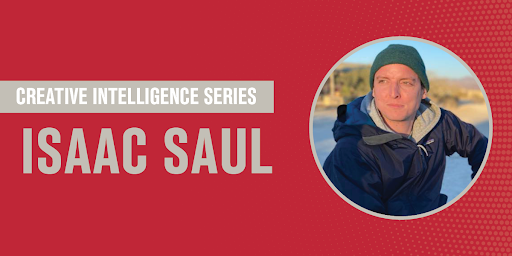On November 30th, Transylvania hosted political journalist and founder of Tangle News Isaac Saul for the talk, “Modern Media in Crisis: Untangling Bias, Partisanship, and Loss of Trust in the News.” The talk was part of Transylvania’s Creative Intelligence Series, an annual project designed to bring in speakers all related to a particular theme, with the theme for 2023-24 being “Skeptical Odysseys: Through a Glass Darkly.” Saul founded Tangle News in 2019, a news outlet with a daily newsletter that markets itself on and has been recognized for its ability to highlight perspectives across the political spectrum.
Saul began the talk by discussing the declining trust in media, particularly newspaper and television news, that has been seen over the past few years in the American public. While Saul acknowledged arguments that the increased skepticism that distrust in news implies could be a good thing, he argued that this growing distrust was troubling, saying “In a democratic country like ours, citizens turn to the media to educate themselves; to make informed decisions about who they’re going to vote for. It is important to be well informed, but five out of every six of us don’t trust the premier news sources that we’re supposed to get informed by.”
This distrust of mainstream news inspired Saul to found Tangle News in 2019. For Saul, the growth of Tangle News from a side project to a newsletter viewed by more than 80,000 people can be attributed to “an appetite that is out there right now for non-mainstream news and the kind of news that can challenge people.” Tangle News accomplishes this through the format of its newsletter, which takes one story per day and presents three arguments from each side of the political aisle, with Saul presenting his own opinion at the end of the newsletter. Through this approach, Tangle News has been able to build a politically diverse audience. Saul commented on why he believes an outlet like Tangle, which mainly analyzes existing news, is necessary, stating, “I believe our current media ecosystem is broken. I think without massive changes to the industry it’s probably doomed. And I think the forces driving much of what is wrong with our media ecosystem are often more insidious and harder to grasp than just simple bias that certain reporters have.”
When delving into the forces that he argued were contributing to the broken nature of modern media, Saul began with a lack of balance in reporting. Saul used examples of articles from the New York Times and Wall Street Journal on the same topics to show how news outlets frame issues in a non-neutral way to appeal to a specific audience, leading in this case to, as Saul put it, “two audiences that are living in two separate realities.” Saul then looked to transparency, a value he argued is at the heart of Tangle News since it allows him to openly share his opinion. Saul suggested that newsrooms could simply issue more prominent and explanatory corrections to increase transparency and dispel suspicions that mistakes happen for insidious reasons. Arguably the most important factor for Saul was the makeup of newsrooms. Saul argued that the reality of most journalists politically identifying as moderate to left-leaning has created a conservative minority in journalism that is increasingly unwilling to criticize conservative policy. Saul stressed the importance of politically diverse hiring in stopping the development of an ideological culture in a newsroom.
Saul spent the rest of the talk examining case studies of reporting that he believed fell short of the standards needed to maintain reader trust, such as the New York Times reporting of the Israel/Hamas Conflict and the Fox News coverage of the 2020 Presidential election. Saul ultimately emphasized the importance of paying closer attention to the news experience as a consumer, stating, “If you feel like your views are not being challenged, your mind isn’t being changed, you aren’t learning something new, or you aren’t feeling a little upset, angry, or curious, then you need to expand the sources that you are pulling from.”



